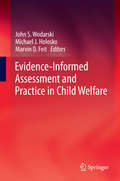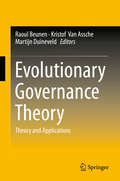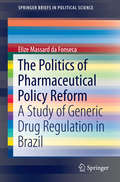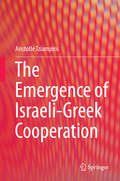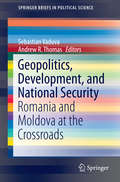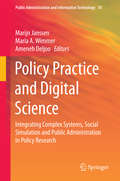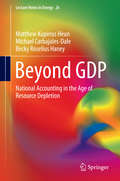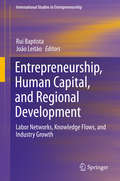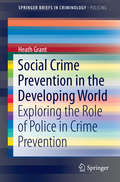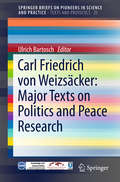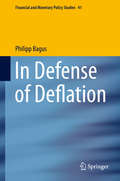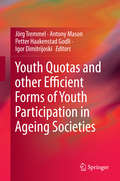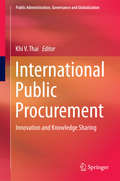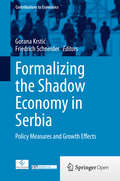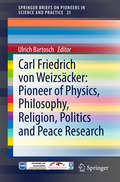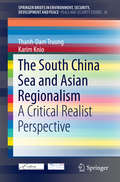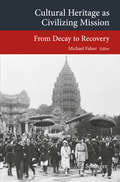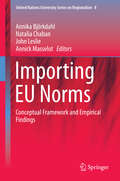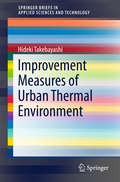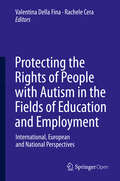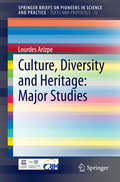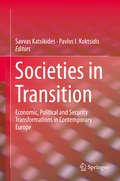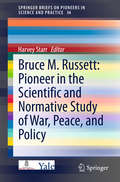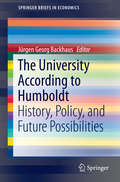- Table View
- List View
Evidence-Informed Assessment and Practice in Child Welfare
by Michael J. Holosko John S. Wodarski Marvin D. FeitThis practice-oriented text presents evidence-based assessment methods and interventions that have been extensively field-tested in child welfare settings. The contributors offer empirical and field insights, comprehensive treatment models, and curricula in key areas such as child maltreatment, substance abuse, parent training, social skills, and youth employment interventions. For the professional reader, the book offers real-world guidance on social work practice, from hiring opportunities within a system to promoting lasting change as families and their issues grow increasingly complex. These chapters also take significant steps toward future improvements in child protection systems as the field evolves toward being more coordinated, effective, and professional. Included in the coverage: Legal requisites for social work practice in child abuse and neglect. The integrated model for human service delivery in child welfare. Risk assessment: issues and implementation in child protective services. Substance use and abuse: screening tools and assessment instruments. The process of intervention with multi-problem families. Preventative services for children and adolescents. Its multi-level approach makes Evidence-Informed Assessment and Practice in Child Welfare an essential professional development text for social workers, particularly those new to the job, as well as a progressive blueprint for social work administrators.
Evolutionary Governance Theory
by Raoul Beunen Martijn Duineveld Kristof Van AsscheThis volume presents empirical studies and theoretical reflections on Evolutionary Governance Theory (EGT), its most important concepts and their interrelations. As a novel theory of governance, EGT understands governance as radically evolutionary, which implies that all elements of governance are subject to evolution, that these elements co-evolve and that many of them are the product of governance itself. Through this book we learn how communities understand themselves and their environment and why they create the complex structures and processes we analyze as governance paths. Authors from different disciplines develop the EGT framework further and apply it to a wide rage networks of power, governance of agricultural resources etc. The contributors also reflect on the possibilities and limitations of steering, intervention, management and development in a world continuously in flux. It bridges the gap between more fundamental and philosophical accounts of the social sciences and applied studies, offering theoretical advancements as well as practical recommendations.
The Politics of Pharmaceutical Policy Reform
by Elize Massard da FonsecaBrazil is renowned worldwide for its remarkable reforms in pharmaceutical regulation, which have enhanced access to essential medicines while lowering drug costs. This book innovates by analysing the generic drug reform in Brazil, demonstrating that pharmaceutical regulation is only partially influenced by non-state actors. Little is known about the institutional antecedents and policy process that channeled this regulatory reform. This is particularly intriguing because a regulatory shift in the pharmaceutical sector requires the participation of a number of stakeholders and interest groups in the policy process. Fonseca examines the generic drug reform's causes and consequences. No study has approached the generic drug regulation in Brazil from this perspective. The Politics of Pharmaceutical Policy Reform: A Study of Generic Drug Regulation in Brazil, explores the following: · The politics of pharmaceutical regulation in Brazil over the last 25 years. · The political negotiations to approve the Generic Drug Act, which involved a hard-to-reach agreement between the pharmaceutical industry (national and multinational), the Ministry of Health, and Congress · The controversial decisions to regulate packaging and pharmaceutical equivalence. · The surprising success of Brazilian pharmaceutical firms, which became market champions in a sector largely dominated by multinational firms. · Comparative lessons from the Brazilian case for the political construction of regulatory standards to regulate generic drugs and its effects on global health. This book will interest political scientists and health policy scholars concerned with the political conflicts in the pharmaceutical sector. It argues against well-established approaches to regulatory capture such as control of the regulatory process by interest groups and policy diffusion. It can be used as evidence for graduate courses in public policy, health policy and political science. Because Brazil is one of the largest markets for pharmaceuticals in the world, business leaders and consultancy firms would also be interested.
The Emergence of Israeli-Greek Cooperation
by Aristotle TziampirisThis book offers a detailed account of the recent Israeli-Greek rapprochement. For more than six decades, relations between Greece and Israel were characterized by suspicion, mutual recriminations and hostility. However, in 2009, Greek policy was unexpectedly overturned. This volume examines this new relationship in detail and explores its theoretical and regional consequences. The Introduction provides a general framework of Greek foreign policy within which the rapprochement with Israel was pursued. Chapter I presents the book's theoretical framework, focusing on balance of power theory and emphasizing the arguments of Morgenthau, Waltz, and Mearsheimer. Chapter II delineates the fraught relations between the Greeks and the Jews, despite their cultural and historical commonalities, and analyzes the reasoning behind decades of antagonistic foreign policy. Chapter III describes how the rise of Turkey during Greece's economic crisis and the gradual deterioration of the strategic partnership between Israel and Turkey combined to create a climate open to Israeli-Greek cooperation. Chapter IV examines the beginning of the rapprochement between Israel and Greece, highlighting Netanyahu's historic 2010 visit to Greece. Chapter V explores the intensification of Israeli-Greek cooperation. Chapter VI discusses energy cooperation in the Eastern Mediterranean, another key factor in the deterioration of Israeli-Turkish relations and the strengthening of ties between Greece and Israel. The book concludes with a return to theory, reiterating the Realist approach and using that framework to hypothesize about the future of the relationship between the two nations. This book is appropriate for graduate students and academics studying international relations and foreign policy in the Eastern Mediterranean, as well as policymakers, activists and journalists who want to have a clearer understanding of the Israeli-Greek rapprochement and other developments in the region.
Geopolitics, Development, and National Security
by Andrew R. Thomas Sebastian VaduvaThis volume focuses on the spotlight on Romania and Moldova, two distinct nations that share a common language, history and culture. Romania is a NATO member since 2004 and a fully integrated nation into the European Union since 2007, while The Republic of Moldova (a former Soviet republic) is attempting to join both international organizations for security and development reasons. Ever since the Iron Curtain fell on Europe at the end of World War II, the term "Eastern Europe" has been used without much regard for the diversity of the region. Given the geographical proximity, perhaps this is an understandable error. However, moving forward into the twenty-first century, and considering the highly sensitive geopolitical, security and development issues playing out in the region, we believe each nation should be treated with the unique distinction it deserves. Building a mosaic of the most current research, practical application, and policy, the authors, who represent unique, insider perspectives, cover a range of emerging and timely topics from Black Sea security to cultural analyses, organizational development and risk assessment shedding light on social, political and economic challenges of rapid transition in the region, while considering the implications for research, practice and policy in other front-line regions around the world.
Policy Practice and Digital Science
by Maria A. Wimmer Marijn Janssen Ameneh DeljooThe explosive growth in data, computational power, and social media creates new opportunities for innovating the processes and solutions of Information and communications technology (ICT) based policy-making and research. To take advantage of these developments in the digital world, new approaches, concepts, instruments and methods are needed to navigate the societal and computational complexity. This requires extensive interdisciplinary knowledge of public administration, policy analyses, information systems, complex systems and computer science. This book provides the foundation for this new interdisciplinary field, in which various traditional disciplines are blending. Both policy makers, executors and those in charge of policy implementations acknowledge that ICT is becoming more important and is changing the policy-making process, resulting in a next generation policy-making based on ICT support. Web 2. 0 and even Web 3. 0 point to the specific applications of social networks, semantically enriched and linked data, whereas policy-making has also to do with the use of the vast amount of data, predictions and forecasts, and improving the outcomes of policy-making, which is confronted with an increasing complexity and uncertainty of the outcomes. The field of policy-making is changing and driven by developments like open data, computational methods for processing data, opining mining, simulation and visualization of rich data sets, all combined with public engagement, social media and participatory tools.
Beyond GDP: National Accounting in the Age of Resource Depletion (Lecture Notes in Energy #26)
by Matthew Kuperus Heun Michael Carbajales-Dale Becky Roselius HaneyThis book uses the metaphor "The economy is society's metabolism" as a springboard to develop a rigorous theoretical framework for a better system of national accounts which goes "Beyond GDP" and is relevant to the age of resource depletion. Society is entering a new era in which biophysical limits related to natural resource extraction rates and the biosphere's waste assimilation capacity are becoming binding constraints on mature economies. Unfortunately, the data needed for policy-makers to understand and manage economic growth in this new era are not universally available. All stakeholders need a new way to understand our economy in the context of the biosphere's ability to provide essential natural capital, and we suggest that detailed information about materials, energy, embodied energy, and energy intensity should be routinely gathered, analyzed, and disseminated from a centralized location to provide markets and policymakers with a more comprehensive understanding of the biophysical economy. However, a firm theoretical foundation is needed before proceeding along this new path, which this book is intended to provide. After arguing that the stock of manufactured capital is an important driver of material and energy demands imposed upon the biosphere, a new accounting framework is derived from the laws of thermodynamics to reflect the fact that material and embodied energy accumulate within the capital stock of economic sectors. This framework extends the Energy Input-Output (EI-O) techniques first developed by Bullard, Herendeen, and others to estimate energy intensity of economic products. Implications from the new framework are discussed, including the value of economic metrics for policy-making, the need for physically-based rather than product-based EI-O formulations, a re-assessment of the concept of economic "growth," and an evaluation of recycling, reuse, and dematerialization. The framework also provides an opportunity to assess an array of definitions for Daly's "steady-state economy" in relation to the ideal of a sustainable economy. The book ends with a list of steps to be taken in creating a more comprehensive system of national accounts: National accounting agencies worldwide should develop and maintain balance sheets of both natural and manufactured capital in addition to national income statements All stocks and inter-sector flows should be provided in physical as well as financial units In the US, the Bureau for Economic Analysis (BEA) should restart detailed Capital, Labor, Energy, Material, and Services (KLEMS) reporting National accounting agencies should routinely estimate the energy intensity of economic products, and all of the above should be estimated and disseminated on an annual basis.
Entrepreneurship, Human Capital, and Regional Development
by Rui Baptista João LeitãoThis book makes original contributions to the literature on clusters, human capital, and regional development by focusing on the link between entrepreneurship and economic growth, aiming for a better understanding of the dynamics of growth determined by the entrepreneur's action in the regional space. The focus is therefore on critical reflection and rethinking the articulation between three levels of analysis of economic systems, namely entrepreneurship, human capital and regional development, which have not so far been perfectly articulated in the literature of reference on endogenous growth. Although there has been significant research so far into the success and failure of clusters, the implications of these multiple research efforts fail to provide political decision-makers and company managers with critical information about which mechanisms lie behind cluster success and also about how clusters survive and prosper. The innovative approaches presented in this book on entrepreneurship, human capital mobility and regional development have considerable potential to create new and original implications for decision-makers and managers. In terms of value added, this book contributes to the literature by seeking answers to the following questions: (i) Is the growth and success of clusters over time due to concentration and transmission of business competences through spin-offs located in a given regional space? (ii) Does increased density of job options outside the workplace contribute to increased mobility of human capital between firms located within clusters, and so improve coordination in the local labor market? (iii) Do spin-offs benefit from hiring workers from successful incumbents, inasmuch as those workers are expected to perform better than other workers from different origins? Integrating theoretical frameworks, empirical research, and regional case studies (from Portugal, Spain, Norway and Turkey), the editors and contributors demonstrate that the regional dynamics of industry growth are strongly influenced by the mobility of employees towards new firms.
Social Crime Prevention in the Developing World
by Heath GrantThis Brief explores the role of social crime prevention as a crime reduction strategy in the developing world. "Social crime prevention" focuses on the social and economic factors that may contribute to violence and criminal behavior in a community. Particularly in the developing world, an understanding of the socioeconomic and political context holds long-term potential for crime reduction (rather than crime displacement); however, the strategies are complex and the results may be slow. Generally, police and law enforcement are relied upon to present quick results, where social crime prevention strategies can be viewed as being "soft on crime" or too slow. This Brief discusses the tension between the traditional role of police and proactive social crime prevention strategies in an international context, through a variety of case studies. It also provides recommendations for balancing or reshaping this role. This work will be of interest to researchers and policy makers interested in crime prevention, particularly in the developing world, criminal theory, police studies and related disciplines such as demography, sociology and political science.
Encounters with Popular Pasts
by Helaine Silverman Mike RobinsonThis volume is based on the recognition that heritage is popular and popular culture is now readily transformed into heritage whose meanings and myths reshape social life and political and economic realities as well as re-make "tradition. " The papers in this volume consider: What does popular heritage look like? To whom does it speak? Is it active in dissolving class and cultural boundaries or just in reproducing new ones? How do societies manage a heritage that is fluid, immediate and that straddles extremes of serious conflict and hedonistic frivolity? When/under what circumstances is the creation and expression of new cultural forms - popular culture - capable of being transformed into heritage?.
Carl Friedrich von Weizsäcker: Major Texts On Politics And Peace Research (SpringerBriefs on Pioneers in Science and Practice #25)
by Ulrich BartoschThis book offers a collection of texts by Carl Friedrich von Weizsaecker (1912-2007), a major German universal scientist who was also a pioneer in physics, philosophy, religion on issues of politics and peace research. He worked with Werner Heisenberg and Otto Hahn in the German "Uranverein", obtained a patent for plutonium during World War II and was an opponent of the nuclear armament of the German armed forces (1957). Furthermore, he published a study on the inability to defend Germany (1971) that was instrumental in the debate on defensive defense since the mid 1970s. He wrote on war and peace, peace and truth, policy implications of nuclear energy, on ethical issues of modern strategy, on consequences of war and war prevention and on the theory of power. He coined the term "world domestic policy" which still covers a valid theory for political, institutional secured world peace in the atomic age.
In Defense of Deflation
by Philipp BagusThis book analyses the causes and consequences of deflation. In contrast to the widespread belief that deflation would be harmful to the economy as a whole, the author argues that free market deflation is liberating and beneficial. Several myths of deflation are exposed and the reasons for the widespread deflation phobia that serves to justify expansionary monetary policy, i. e. , inflation are investigated. Two historical case studies, the growth deflation in the US after the Civil War and the bank credit deflation in Germany during the Great Depression are discussed to illustrate the points made in the theoretical analysis of deflation.
Youth Quotas and other Efficient Forms of Youth Participation in Ageing Societies
by Jörg Tremmel Antony Mason Petter Haakenstad Godli Igor DimitrijoskiThis book examines ways to ensure that the rights, interests and concerns of young people are properly represented in Western democracies. One new proposal is the introduction of youth quotas in political institutions in order to counter the possible marginalization of young people caused by demographic ageing and, thereby, an overrepresentation of the interests of the elderly. The book explores key questions regarding the implementation of youth quotas from different perspectives, including philosophy, political science, sociology and demography. It examines whether youth quotas and other measures that give the young more voice and influence in political institutions are a good means for promoting the cause of intergenerational justice. In particular, it investigates how and if youth quotas can be used to ensure that the environmental interests of young and future generations are being taken into account. In addition, the book introduces an innovative model that would give a right to vote to minors without voting age boundaries. The book also discusses suffrage reforms through lowering the voting age in Western countries, as well as introducing methods especially aimed at raising the skills of children necessary for societal citizenship and empowerment of young citizens. The volume will help raise awareness and knowledge about the intergenerational implications of demographic changes in Western democracies, where ageing societies are increasingly turning into gerontocracies. It offers readers deep insight into how youth quotas in particular (and others forms of youth participation in general) might be efficient methods to ensure that younger generations are included in the political decision making process and other activities in society.
International Public Procurement
by Khi V. ThaiSince the 1990s, government at all levels is under increasing pressure to do more with less. However, despite the U. S. government spending about 15 to 20 percent of its GDP on contracts for goods and services, there is a paucity of reference books for public procurement officials and very few textbooks for courses on the subject. Filling this void, the International Handbook of Public Procurement provides the knowledge necessary to understand how procurement works and how to improve the cost-effectiveness of procurement systems. Taking a multidisciplinary approach, the book focuses on the managerial, economic, political, and legal aspects of this topic. It begins with a conceptual framework and highlights various reforms occurring in certain countries. By examining these improvements, readers are able to apply this knowledge to their own strategies. The next section presents selected cases that illustrate the public procurement process, examining systems in various nations including Germany, China, South Africa, Cambodia, Uganda, and Estonia. The book also discusses the rise of electronic procurement systems (E-procurement) and reviews the benefits of these efficient systems. Other topics presented in this comprehensive volume include practical discussions on contract negotiations, bidding, price strategies and cost analysis, and an insightful chapter on the marketOCOs response to contract award announcements. A virtual encyclopedia from numerous international experts, this book was assembled by Khi V. Thai, Professor at Florida Atlantic University and Editor of the Journal of Public Procurement. Dr. Thai has provided technical assistance in the area of public procurement to governments across the world. Empowering those on all sides of the issue, this volume dispenses advice valuable to agovernment officials and contractors, as well as providing a comprehensive text for public administration students.
Formalizing the Shadow Economy in Serbia
by Friedrich Schneider Gorana KrstićThe main objective of this book is to develop a strategy and policy measures to enhance the formalization of the shadow economy in order to improve the competitiveness of the economy and contribute to economic growth; it explores these issues with special reference to Serbia. The size and development of the shadow economy in Serbia and other Central and Eastern European countries are estimated using two different methods (the MIMIC method and household-tax-compliance method). Micro-estimates are based on a special survey of business entities in Serbia, which for the first time allows us to explore the shadow economy from the perspective of enterprises and entrepreneurs. The authors identify the types of shadow economy at work in business entities, the determinants of shadow economy participation, and the impact of competition from the informal sector on businesses. Readers will learn both about the potential fiscal effects of reducing the shadow economy to the levels observed in more developed countries and the effects that formalization of the shadow economy can have on economic growth.
Carl Friedrich von Weizsäcker: Pioneer Of Physics, Philosophy, Religion, Politics And Peace Research (SpringerBriefs on Pioneers in Science and Practice #21)
by Ulrich BartoschThis book offers a collection of texts by Carl Friedrich von Weizsaecker (1912-2007), a major German universal scientist who was a pioneer in physics, philosophy, religion, politics and peace research. He started as an assistant to the physicist, Werner Heisenberg, held professorships in theoretical physics (Strasbourg), physics (Goettingen) and philosophy (Hamburg) and was a co-director (with Juergen Habermas) of a Max Planck Institute for Research into living conditions in a world of science and technology in Starnberg. This unique anthology spans the wide scope of his innovative thinking including his philosophical self-reflections, on peace, nuclear strategy, security and defensive defense, on nuclear energy, on the conditions of freedom, on his experience of religion, including poetry from his early youth. Most texts appear in English for the first time and are selected for use in seminars on physics, philosophy, religion, politics and peace research.
The South China Sea and Asian Regionalism
by Thanh-Dam Truong Karim KnioThis book offers an innovative approach to the analysis of the current crisis in the South China Sea. Moving beyond the spirit of the UN Convention on the Law of the Sea (UNCLOS), the mechanisms of which are limited to physical geography, it demonstrates how epistemological insights from the field of critical realist philosophy can reveal the importance of cultural and structural conditioning processes in social interactions, processes which shape the conditions for the emergence of crisis points along a spectrum of conflict and cooperation. The potential for conflict resolution and the emergence of new regions in Pacific Asia much depends on the nature of such interactions at many levels (political-economic, semiotic and cultural) based on perceptions of what constitutes the "common" versus a Sinicised version of "Lebensraum".
Cultural Heritage as Civilizing Mission: From Decay to Recovery (Transcultural Research – Heidelberg Studies on Asia and Europe in a Global Context)
by Michael FalserThis book investigates the role of cultural heritage as a constitutive dimension of different civilizing missions from the colonial era to the present. It includes case studies of the Habsburg Empire and German colonialism in Africa, Asian case studies of (post)colonial India and the Dutch East Indies/Indonesia, China and French Indochina, and a special discussion on 20th-century Cambodia and the temples of Angkor. The themes examined range from architectural and intellectual history to historic preservation and restoration. Taken together, they offer an overview of historical processes spanning two centuries of institutional practices, wherein the concept of cultural heritage was appropriated both by political regimes and for UNESCO World Heritage agendas.
Importing EU Norms
by John Leslie Annika Björkdahl Natalia Chaban Annick MasselotThis interdisciplinary work presents a conceptual framework and brings together constructivist and rationalist accounts of how EU norms are adopted, adapted, resisted or rejected. These chapters provide empirical cases and critical analysis of a rich variety of norm-takers from EU member states, European and non-European states, including the rejection of EU norms in Russia and Africa as well as adaptation of EU practices in Australia and New Zealand. Chapters on China, ASEAN and the Czech Republic demonstrate resistance to EU norm export. This volume probes differences in willingness to adopt or adapt norms between various actors in the recipient state and explores such questions as: How do norm-takers perceive of the EU and its norms? Is there a 'normative fit' between EU norms and the local normative context? Similarly, how do EU norms impact recipients' interests and institutional arrangements? First, the authors map EU norm export strategies and approaches as they affect norm-takers. Second, the chapters recognize that norm adoption, adaption, resistance or rejection is a product of interaction and a relationship in which interdependence, asymmetry and power play a role. Third, we see that domestic circumstances within norm-takers condition the reception of norms. This book's focus on norm-takers highlights the reflexive nature of norm diffusion and that nature has implications for the EU itself as a norm exporter. Anyone with an interest in the research agenda on norm diffusion, normative power and the EU's normative dialogue with the world will find this book highly valuable, including scholars, policy makers and students of subjects including political science, European studies, international relations and international and EU law.
Improvement Measures of Urban Thermal Environment
by Hideki TakebayashiMaximizing readers' insights into urban and architectural environmental planning with consideration for the thermal environment, this work highlights how various urban heat-island strategies have been developed and their effectiveness in urban areas. Specific measures to combat the urban heat-island phenomenon, including improvement of surface cover, reduction of exhaust heat, improvement of ventilation are summarized and various heat-island measurement technologies, which have been proposed in recent years, are organized systematically based on surface- heat budget and surface boundary layer models. With suggestions for the selection of appropriate heat-island technologies depending on the location, this book elucidates the relationship between the thermal environment and urban block form characteristics. Covering the latest research findings, this book is of interest for all those concerned with environmentally friendly urban and architectural planning.
Protecting the Rights of People with Autism in the Fields of Education and Employment
by Valentina Della Fina Rachele CeraFundamental rights for all people with disabilities, education and employment are key for the inclusion of people with autism. They play as facilitators for the social inclusion of persons with autism and as multipliers for their enjoyment of other fundamental rights. After outlining the international and European dimensions of the legal protection of the rights to education and employment of people with autism, the book provides an in-depth analysis of domestic legislative, judicial and administrative practice of the EU Member States in these fields. Each chapter identifies the good practices on inclusive education and employment of people with autism consistent with principles and obligations enshrined in the UN Convention on the Rights of Persons with Disabilities (Articles 24 and 27). The book contains the scientific results of the European Project "Promoting equal rights of people with autism in the field of employment and education" aimed at supporting the implementation of the UN Convention in the fields of inclusive education and employment.
Culture, Diversity and Heritage: Major Studies (SpringerBriefs on Pioneers in Science and Practice #12)
by Lourdes ArizpeThe texts presented in this book trace the rise of culture as a major concern for development, international diplomacy, sustainability and national politics over the past two decades. As a major participant in anthropological field research, advocate for cultural freedom and decision-maker in international programs on culture, the author gives a firsthand account of the trade-offs, the contradictions and the management of consensus in these fields. She argues that the constitutive, functional and instrumental aspects of cultural narratives call for a more in-depth understanding of knowledge, leading to cultural and social sustainability in the framework of a "new worlding". Many of the texts gathered here were presented at the United Nations General Assembly and other high-level international meetings. Most of the texts are unpublished; some were first published in Spanish and are now available in English for the first time.
Societies in Transition
by Savvas Katsikides Pavlos I. KoktsidisThis edited volume discusses critically the social implications of current structural transformations in Europe within the broader context of the global financial crisis. Experts from across Europe and the US discuss challenges and solutions to political and economic stability, security, growth, governance and integration on a country and regional level, especially focusing on vulnerable Southern and Eastern European states. New economic, political and security processes and realities are examined closely, with the aim to describe them in a coherent framework. Drawing on carefully selected interdisciplinary research, this collection offers fresh insights into the social repercussions of the transition from traditionally established practices and perceptions to new forms of collaboration, integration and governance.
Bruce M. Russett: Pioneer in the Scientific and Normative Study of War, Peace, and Policy (SpringerBriefs on Pioneers in Science and Practice #34)
by Harvey StarrThis book provides a comprehensive treatment of Russett's scientific contributions, with key examples of his major studies. It will greatly benefit today's International Relations students, deepening their understanding of the field's theory and methods. Bruce M. Russett was a founder of, and continues to be a pioneer in, the empirical analytical study of international relations and foreign policy. He has produced groundbreaking works on methodology, data collection and the application of economics to the field of international relations--especially in the area of analytical relationships between theory, policy and normative standards for morality and ethics. His body of work has clarified and furthered our understanding of peace studies by addressing power and conflict, cooperation, integration and community, democratic/Kantian peace, economic development, dependency and inequality, and the relationships between domestic and foreign politics. Russett's academic achievements and standing are the result of his bringing these areas together as a coherent entity, based on his eclectic ability to "cross boundaries" with regard to academic disciplines, sub-disciplines, methods of data gathering and analysis, and broad theoretical perspectives, as well as basic and applied research.
The University According to Humboldt
by Jürgen Georg BackhausThis book discusses the philosophy and educational reforms initiated by Wilhelm von Humboldt as well as their legacy in the modern university system. It begins with a discussion of the history of the university from antiquity and the Middle Ages through the era of Humboldt's reforms and its remnants in and implications for the present day. The authors then delve into policy, outlining the key conflicts that have informed the development of university educational policy, such as the clash between academia and professional education, the coordination of public administration and educational institutions, and the perennial issue of funding. Humboldt's ideas are then discussed within an economic context, using his principals of the state to analyze the relationship between current models of household and family economics and German economic and social policy. The book is rounded off by a philosophical analysis of the institution of the university and concludes with an update of the remains Humboldt's reforms within the current university system. With its multidisciplinary approach to the study of higher education reform in Europe and its key players, this book will appeal to scholars of economic history, educational policy, and public administration as well as administrators and policy makers in higher education.
